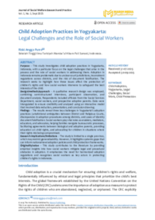This study examines child adoption practices in Yogyakarta, Indonesia, focusing on the legal challenges and the critical role of social workers in safeguarding children’s rights. Adoption processes in the region are complicated by unclear court jurisdictions, inconsistent procedures across districts, and risks of document falsification, which can undermine the protection of children. Using qualitative methods—including interviews, observation, and document analysis—the research identifies three main challenges: jurisdictional ambiguities between District and Religious Courts, procedural discrepancies, and falsified identity documents. Social workers are shown to act as enablers, mediators, educators, and advocates, guiding families through bureaucracy, facilitating agreements between biological and adoptive parents, educating on child rights, and advocating for children’s best interests. While the study is limited to one province, it highlights systemic gaps that could inform national adoption policies and child protection frameworks, emphasizing the need for harmonized regulations and the essential role of social workers in protecting children in Indonesia.

